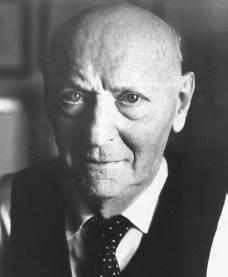Isaac Bashevis Singer Biography
Born: July 14, 1904
Radzymin, Poland
Died: July 24, 1991
Miami, Florida
Polish-born American author
I saac Bashevis Singer, a Polish-American author, was admired for his recreation of the forgotten world of nineteenth-century Poland and his depiction of a timeless Jewish ghetto (a city neighborhood where a minority group lives).
Early life
Isaac Bashevis Singer was born on July 14, 1904, in Radzymin, Poland. His family moved to Warsaw, Poland, when he was four years old. Both of his grandfathers were rabbis (Jewish spiritual leaders), and Singer was also groomed for Hasidism, a strict spiritual practice, and attended a seminary (a school to train rabbis). However, he decided on a writing career. His older brother, Israel Joseph, was a well-known Yiddish (a language spoken by Jewish people in eastern Europe) writer. Growing up, Singer was impressed by the Jewish folk tales told by his parents. These tales set the groundwork for some of Singer's fictional characters and religious faith.
After Singer completed his seminary studies, he worked as a journalist for the Yiddish press in various parts of Poland. Moving to the United States in 1935, Singer became a reporter for the Daily Forward in New York City, America's largest Yiddish newspaper. Although he personally adapted to his new habitat, his early literary efforts display an appreciation for the "old country." The subjects seem part of a distant past remembered from vivid tales of Polish storytellers.
First works
Singer's first novel, The Family Moskat (1950), was likened by critics to the narratives of the Russian writer Ivan Turgenev (1818–1883) and the French writer Honoré de Balzac (1799–1850). Based on Singer's own family, the novel succeeds in translating the reality of an orthodox (traditional) Jewish home into a universal reality. Two short stories, "Satan in Goray" and "The Dybbuk and the Golem" (1955), treat the superstition and foolishness of eastern European peasants (people from the lower,

Reproduced by permission of
Modern man is the subject of Singer's novel The Magician of Lublin (1960), which portrays a protagonist (main character) who dares to violate the holiness of tradition. The novel lacks the superb intricacy of The Family Moskat and the haunting suspense of "Gimpel." Still grappling with the modern experience in his next work, Singer set the eleven short pieces of The Spinoza of Market Street (1961) in a ghetto after World War II (1939–45; a war in which the United States, Great Britain, France, and the Soviet Union fought against Germany, Japan, and Italy). Having departed from his quaintly unsophisticated world into contemporary urban madness, Singer revealed the stylistic limitations of his simple, flowing writings. "I've always stayed in my same nook, my same corner," Singer once reflected. "If a writer ventures out of his corner he is nothing."
Later work
Singer's The Slave (1962), an epic about seventeenth-century Poland, recounts the brutal world of Russian Cossacks (peasant soldiers in the Ukraine) through the eyes of an enslaved, sensitive Jew; yet somehow the work appeals to modern sensibilities. Once again Singer's flawless writing recaptures a timeless folk element. When a collection of scenes filled with memories of Singer's childhood in the Warsaw ghetto (an extremely poor neighborhood), A Day of Pleasure: Stories of a Boy Growing Up in Warsaw (1969), won the National Book Award for children's literature, Singer remarked that he wrote for young people because "they still believe in God, the family, angels, devils, witches, goblins, and other such obsolete stuff." A Friend of Kafka, a collection of short fiction, appeared in 1970.
Recipient of numerous other literary awards, Singer remained an active journalist and critic for the Daily Forward. He always wrote in Yiddish and then worked closely with his English translators (people who change text from one language to another) because of the difficulty in finding equivalents for his subtle writings. His "simple" and "unchanging" fictions have gained in popularity with a new generation possessing a taste for an obscure and sometimes grotesque past which seems more real than an unclear future, for his stories capture the essence of the human condition.
Singer received numerous awards throughout the latter portion of his life. Some of the more noted include Nobel Prize in literature (1978) and the Gold Medal for Fiction (1989). Singer continued to publish new material until his death in 1991.
For More Information
Farrell, Grace, ed. Critical Essays on Isaac Bashevis Singer. New York: G. K. Hall, 1996.
Goran, Lester. The Bright Streets of Surfside: The Memoir of a Friendship with Isaac Bashevis Singer. Kent, OH: Kent State University Press, 1994.
Hadda, Janet. Isaac Bashevis Singer: A Life. New York: Oxford University Press, 1997.
Siegel, Ben. Isaac Bashevis Singer. Minneapolis: University of Minnesota Press, 1969.
Singer, Isaac Bashevis. In My Father's Court. New York: Farrar, Straus and Giroux, 1966.
Zamir, Israel. Journey to My Father, Isaac Bashevis Singer. New York: Arcade, 1995.
Comment about this article, ask questions, or add new information about this topic: